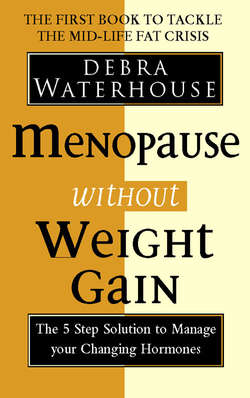Читать книгу Menopause Without Weight Gain: The 5 Step Solution to Challenge Your Changing Hormones - Debra Waterhouse - Страница 13
Taking the ‘Men’ Out of ‘Menopause’
ОглавлениеWhen it comes to fat cells, life transitions, weight loss and weight gain, there is no such thing as equality of the sexes.
Actually, men’s fat cells have a fairly boring existence. At puberty, young men gain muscle and lose fat. And of course, men don’t experience the fat-storing frenzy of pregnancy or the menopause. Steady testosterone levels keep men’s fat cells smaller, with more releasing enzymes and fewer storage enzymes.
When researchers analysed a fat cell from a man’s buttocks and one from a woman’s buttocks, this is what they found:
• A woman’s fat cell is five times larger than a man’s.
• A woman’s fat cell has more than twice the fat-storing enzymes.
• A woman’s fat cell has half the fat-releasing enzymes.
The weight battle of the sexes continues. Men also carry about 3 stone more muscle on their bodies, and therefore have faster metabolisms. Because of these factors, men can eat 30 per cent more calories than we can (without gaining weight) and can burn 30 per cent more calories during aerobic exercise than we can. They even burn more calories while sleeping – about 200 calories more. So whether they’re eating, exercising or snoring, they are disposing of calories with little effort.
No wonder men have more success with dieting: they lose twice as much weight, twice as quickly, and are twice as likely to keep it off as we are. By virtue of their gender, they have the fat-burning machinery to lose weight quickly and efficiently. But they are also cast into this world with a relative inability to survive a famine. Anthropological studies have found that up to 50 per cent of men perished in famines, while only 10 per cent of us did. We can thank oestrogen and the menopause for our anti-famine protection.
As men grow older, they do lose some muscle mass, but we lose twice as much. They do gain some body fat, but we gain twice as much. Weight gain peaks for men at age 44, for us at age 55 (right as we’re exiting the transition to the menopause). Somewhere around age 40, men experience a slow decline in testosterone, but for the next 30 years, their levels are still within the ‘normal’ ranges. In comparison, between the ages of 35 and 55, we experience a 75 per cent drop in oestrogen.
I often wonder what would happen if men encountered the fat-storing effects of oestrogen and the menopause. What would their bodies go through and how would they cope with it? One interesting study attempted to explore this question by injecting men with oestrogen. Within days they gained weight – and it took months to lose it!
Perhaps all men should be injected with oestrogen just once so they can have a hands-on understanding of what women struggle with. In lieu of oestrogen injections or dissolving birth control pills in their drink, share the following table with the men in your life and give them a crash course on the gender differences in fat cells.
After my friend Sheila shared this information with her husband, they concluded, ‘Our fat cells are worlds apart. Maybe men’s fat cells really are from Mars and women’s are from Venus.’ Maybe so, but this isn’t to say that some men don’t struggle with their weights. Gender is one side of the weight-gain story, genetics is the other, and lifestyle is involved in both. But we have a biological explanation for our midlife weight gain; they don’t. We also have a biological advantage for living longer that they haven’t figured out yet.
When it comes to longevity, Mother Nature definitely favours her own gender. Of children born today, one in three girls will live to be 100 years old, but only one in ten boys will. Of those alive today, women will outlive men by eight years, and men are more likely to die earlier from just about every cause of death. Our bodies and fat cells are doing something right. Men lose twice as much weight as they grow older. From age 60 on, they lose 2 stone; we only lose 1 stone. Our ability to hold on to fat gives us the ability to hold on to life.
I hope that you now understand the necessity of midlife weight gain and realize that you are not gaining weight, your body is. And your body is dedicated to this weight gain for essential reasons. Having this knowledge is vital, and it doesn’t mean that you can’t do anything about it. You may not be able to prevent menopausal body changes entirely, but with the guidance in this book you can minimize them, shrink your fat cells without compromising their ability to produce oestrogen, and find a new healthy weight that’s right for you and your body.
As in puberty and pregnancy, all women need to gain some weight during the menopause. Gaining too much or too little can compromise our health and well-being. Can you see your doctor monitoring your weight gain in the menopause as in pregnancy? ‘Oh good! You’ve gained three pounds; you’re right on target.’ Or, ‘You’re in your third year of the perimenopause and have only gained one pound – better focus on gaining weight.’
This kind of menopausal care may seem preposterous today, but as society gains a greater understanding of why women need to gain some weight during midlife, it may very well happen in the future.
